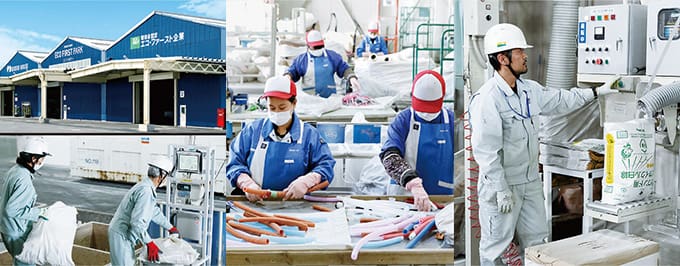
Circular Economy Action policies③
Changing the focus of recycling systems from quantity to quality
![]()
![]()
![]()
Improving the quality of recycled products → 90% material recycling rate
Activity report
Promoting zero emissions with a material recycling rate of 83.1%

Thanks to our zero emissions initiative, the amount of waste generated per building has been reduced by a substantial 60% since FY1999. Following the phase in which we were able to significantly reduce the amount of waste generated, we are currently maintaining that level of waste reduction.
However, with the recent global trend toward emphasizing a “circular economy,” it is becoming more important not only to reduce the amount of waste generated, but also to design the entire business around an effort to improve the quality of recycling.
In light of this trend, we have been improving our construction methods by incorporating feedback from reviews of our construction methods. We are doing so by utilizing the strengths of our in-house production and direct construction that is not based on the agency method.
Moreover, by practicing thorough sorting in order to sort, categorize, and process waste to meet the exact needs of recyclers, we are contributing to a higher quality of recycling.
At the same time, we are conducting research on our attainment of an 83.1% recycling rate in FY2019 with the aim of reaching 90% of our zero emissions goal during the production, construction, and maintenance phases.
Examples of products resulting from our in-house processing of recycled materials
We collect scrap plasterboard from new house construction sites and mix it with crushed eggshells collected from food processing plants. This produces Platama Powder, an athletic field marking chalk made from recycled products.


Researching recycling methods for difficult-to-process composite materials
In the future, we will enter the phase of promoting the recycling of composite materials, which present a challenge for recyclers, and the development of building materials that can later be recycled. In 2019, in order to promote research on this difficult problem, we undertook research and development in collaboration with academia and in conjunction with recyclers to address the recycling of composite materials.
Sustainability Report 2020 TOP
Contributing to Health, Longevity and Wealth
Pursuing Customer Satisfaction through Our Value Chain TOP
Action policies ② Meticulous supply chain management for material procurement
Action policies ③ Enhancing production and distribution quality and improving operational efficiency
Action policies ④ Strengthening our workmanship and maximizing our construction capabilities
Basic concept & Action policies | Promoting Diversity
Basic concept & Action policies | Workstyle Reforms
Basic concept & Action policies | Human Resource Development
Independent Third-Party Assurance Report



